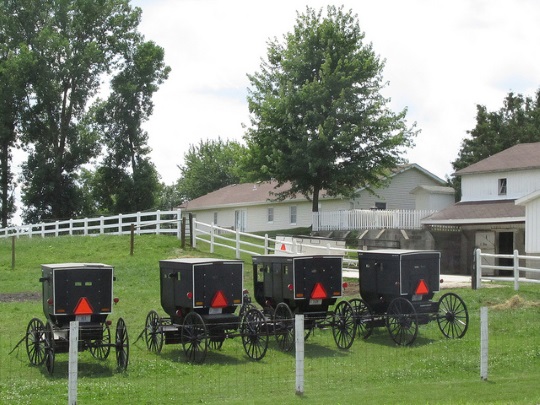Merlyn Yoder: Singing for the Ministers
Merlyn Yoder belongs to an Old Order Amish church in northern Indiana. A few weeks ago he shared why he felt the Ausbund is such an important book.
 In Why the Amish Sing: Songs of Solidarity and Identity, author D. Rose Elder explores the different purposes of Amish church song, including “to uplift spirits, to express devotion, and to experience joy in faithfulness to God.” As an Amish person she quotes puts it, simply, “We sing to praise God” (p. 26-27).
In Why the Amish Sing: Songs of Solidarity and Identity, author D. Rose Elder explores the different purposes of Amish church song, including “to uplift spirits, to express devotion, and to experience joy in faithfulness to God.” As an Amish person she quotes puts it, simply, “We sing to praise God” (p. 26-27).
Today Merlyn discusses another important, less obvious reason Amish sing on Sunday–for the benefit of their church leaders.
Singing for the Ministers
There are several reasons why we sing in church. The obvious reason being the worship of our dear Lord. One other reason that may be overlooked is singing for our ministers.
I don’t know any minister that wanted their position. When the need arises and the congregation is in agreement, a minister is chosen by using the lot. We believe God’s hand is in this. Most ministers I know of will resign themselves to their new responsibilities and put forth quite an effort. Often when two or three ministers are together they will share their discoveries, struggles, and concerns. Often there is a little wry humor. They support each other.
The rest of us might appear to be quite unburdened in contrast. We don’t have the worry of public speaking or as much pressure to study and memorize Scripture. We do have a job though. We need to be attentive to the sermon. We also need to put effort into the singing.
Voicing Support
In our community, having one of more visiting ministers is rather normal. We have a system in place to determine who will do the introduction, read the Scripture, and have the main sermon. The system is based on seniority and who had the most recent turn.
On Sunday morning the minsters will be seated first. As people file in the ministers may be visiting with each other but sometimes they sit in thought.
When everyone is seated the bishop will announce to the effect that the people are now all assembled and we can start worship with singing. The Vorsinger [song leader] will announce the page number then ask someone–usually a visitor–to lead the song. One line is sung. After the first syllable of the second line the ministers will rise and go to a separate room where they will share their thoughts and make the selection of who gets what job.

Meanwhile the congregation keeps on singing. Sometimes the ministers will be able to hear us in the background. How do they feel when the singing is half-hearted and “off”? Or how do they feel when there is substantial effort and participation? Does this give them strength and desire to fulfill their duties?
The second song, our precious Lob Lied, is a prayer for the ministers. Sometimes the ministers will return to the assembly before it is finished. Other times the third song will be underway. It is convenient to stop singing at the end of a verse when the ministers arrive. However our Vorsinger stresses that the ministers are seated before we stop, even if it means an extra verse. That way the one with the introduction has a chance to collect his thoughts before he has the floor.
Over the years I have heard numerous comments about the singing in the sermon. It feels good to be thanked yet the honor belongs to God as He is the one who gave us our talents. Let us use our talents and not be found half full!
Merlyn, his wife, and six children live in northern Indiana. He has a job in the RV industry and his hobbies include woodworking, working on engines, beekeeping, orcharding, and history – especially the study of the Ausbund.
Church buggies image credit: Terence Faircloth/flickr







Thank-you!
Thanks for this excellent explanation of the way the singing can serve as a “thank-you”for the ministers, at the same time it is praise for God.
Church singing is one of the things I miss most about Amish life. I don’t know very many former Amish people who share this sentiment with me.
I remember sitting in church, singing along, and feeling like I was connected to my heritage through the past, the present, and the future. The past because these songs had been passed down to us from our ancestors in Europe. Four hundred years after they started singing these songs, the Amish still do. I had heard stories about people in separate prison cells singing these songs together. I could just imagine how the songs must have reverberated in some of the settings. I felt connected to the present, especially with the Loblied, because I knew that every other Amish church service that was happening at that same time, would be singing the same song at the same time. I often imagined what that sounded like in heaven. And I was connected to the future because I knew that just as these songs had been passed down through the generations, so would they continue to be.
I will be reading the book, “Why the Amish Sing.” Thank you for bringing this to my attention.
Thanks for this Saloma. Reading what you shared here and Merlyn’s previous discussion of his feelings about the Ausbund gives me a glimpse of how personal and powerful church song can be for an Amish person.
What a wonderful explanation Merlyn Yoder has given us. It truly touched my heart. I never heard about how the congregation’s singing fit into Amish church services nor how it “helps” the ministers.
I also appreciate Saloma’s comment about missing Amish singing, and how it makes such an important connection to the past.
There are hymns (from my Catholic past) that I still sing in my head. I remember singing them with my classmates, fellow choir members, at special church occasions like processions during Holy Week or for May Crowning (my favorite time of the church year). Thinking of their words still gives me comfort and brings back fond memories and a smile to my lips. It seems to me that when a congregation sings together, they are of “one heart”, besides being of “one voice.”
Alice Mary
Thanks for sharing Alice Mary. As an outsider hearing Amish hymns it really makes a powerful impression when the entire congregation comes in together following the Vorsinger’s lead. It does stir something in your heart even as a non-German speaking visitor. Being able to participate in song and church singing in particular is yet another thing I take for granted. What a beautiful gift.